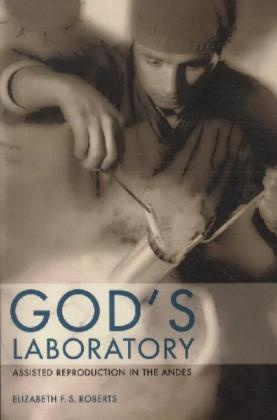Ulteriori informazioni
Zusatztext "This is surely, really, a book of our times. It offers a skillful ethnography, a quite original cultural analysis, a contribution to science studies as well as medical anthropology, an engaging history of divergent religiosities, and a resource for anyone interested in diverse philosophies of personhood." Informationen zum Autor Elizabeth Roberts is Associate Professor of Anthropology at University of Michigan, investigating scientific and public health knowledge production and its embodied effects in Latin America and the United States. Klappentext “Bold and gripping, God’s Laboratory is ethnography at its best. The book’s unforgettable characters and their desperate travails to reproduce via global medicine are the very fabric of a highly-original and much-needed social theory for our twenty-first century technological societies.”—João Biehl, author of Vita: Life in a Zone of Social Abandonment " God’s Laboratory is the perfect anthropological antidote to the fetishization of reproductive materials as 'life itself.' Roberts shows in meticulous detail and in luminous prose how Catholic scientists and technicians in Ecuador invite God into private IVF labs to ‘bless the work’ of producing embryos. Kinship, care, and cultivation—not embryonic life—define reproduction in this uncertain world." - Nancy Scheper-Hughes, author of Death Without Weeping: The Violence of Everyday Life in Brazil “Written with clarity, compassion, and self-reflection, God's Laboratory is a beautiful book which puts the ethnographic method to excellent use. Roberts's painstaking fieldwork unearthed the many layers through which the aspirations for fertility and use of infertility technologies instantiate not only gender and kinship in Ecuador, but ethnicity, race and region in the national project of modernity. The book is a stunning instance of the benefits which accrue when the study of reproduction is used as an optic for understanding social life.”—Rayna Rapp, author of Testing Women, Testing the Fetus: The Social Impact of Amniocentesis in America “ God’s Laboratory is a strong, intriguing and careful look at the daily connections between faith and science that underpin the process of human assisted reproduction in urban Ecuador."—Marisol de la Cadena, author of Indigenous Mestizos: The Politics of Race and Culture in Cuzco, Peru, 1910-1991 Zusammenfassung An ethnography of in vitro fertilization in Ecuador. It shows how having children through biotechnological intervention is not only tolerated, it is embraced by the population, despite widespread poverty and official condemnation by the Catholic Church. Inhaltsverzeichnis List of Illustrations Acknowledgments Cast of Characters Preface Introduction: Reproductive Assistance Corporeal Punishment: Sandra 1. Private Medicine and the Law of Life Crazy for Bingo: Consuelo 2. Assisted Whiteness Yo Soy Teresa la Fea/Ugly Teresa 3. White Beauty: Gamete Donation in a Mestizo Nation When Blood Calls: Frida and Anabela 4. Egg Economies and the Traffic between Women Abandonment: Vanessa 5. On Ice: Embryo Destinies Conclusion: Care-Worthy Notes References Index ...

